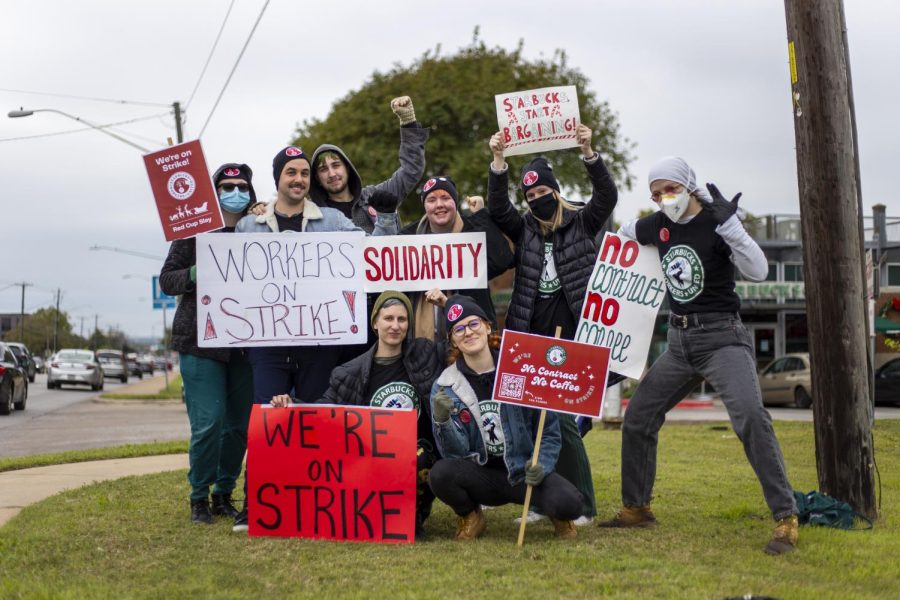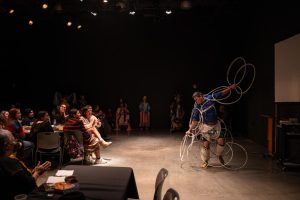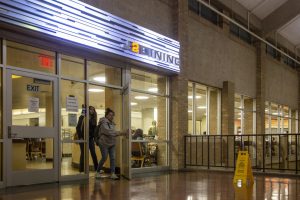Local Starbucks employees protest Red Cup Day, claim lack of union negotiations
November 21, 2022
Over 100 Starbucks stores across the nation, including the 45th Street and North Lamar Boulevard location, held protests Nov. 17 over stalled union contract negotiations, employees said.
In June, the 45th and North Lamar location became the first store to unionize in Texas; however, baristas at the store have yet to negotiate a contract with the corporation, said Roisin Potts, the location’s shift supervisor. The union’s protests, called the Red Cup Rebellion, occurred on the company’s Red Cup Day, when customers receive a free reusable red cup when ordering a seasonal beverage.
“The reason that Red Cup Day was chosen by the union was the business that’s expected on that day,” Potts said. “It’s one of Starbucks’ busiest and most profitable days because of the hype surrounding the plastic cups and the holiday drinks. It was chosen specifically to make as much impact on Starbucks’ profits as possible.”
Potts, who’s worked at Starbucks for about three years, said their store has served about 200 people per hour during its busiest hours of the holiday season. Expecting an overflow of customers from Nov. 17, the store extended their protests to Nov. 18, Potts said.
“It’s also essentially our Black Friday,” protesting employee Sam said. “Black Friday itself encompasses a kind of dread for workers — specifically about interactions you’re gonna have with customers. … It can be very draining and very hurtful for a lot of partners to work those days and get no extra compensation.”
The goal of the protests is to get Starbucks to bargain with not only the 45th and North Lamar store, but with all of the over 250 stores across the nation that have unionized, Potts said. Starbucks spokesperson Bridget Babcox said in an email the company proposed meeting dates with 80 unionized Starbucks locations in October.
“We’ve shown up to more than 50 bargaining sessions across the country and have another 60 scheduled in the coming weeks,” Babcox said.
In addition to contract negotiations, employees protested due to staffing shortages, which are causing long wait times for customers, Potts said.
Around a dozen employees protested in a picket line Nov. 17 and 18, Sam said. With a majority of the staff protesting, store managers and baristas from other Starbucks locations staffed the location during the protests, Potts said.
“They definitely staffed more, and they had more people (staffed) earlier in the day than we would have on a regular day,” Potts said. “So (managers) gave themselves a cushion that they would not have given us.”
Potts and Sam both said Starbucks district managers were polite to protesters. Babcox said the company respects unionized employees’ rights to participate in lawful protests.
Potts said the protesters also had positive and supportive interactions with regular customers at the store, with some even deciding not to buy coffee during the protests.
“So a lot of our regular customers respected our strike and refused to patronize the store (Nov. 18) and a lot of them (on Nov. 17) were like, ‘I’m just gonna abandon my coffee’ or ‘I’m just gonna not order today. I’ll just go make my coffee at home,’” Potts said.
After the protests, Potts and Sam said they hope to meet with Starbucks at the bargaining table soon.
“This whole drive is (because) we want to meet (Starbucks) at the bargaining table and get the contract signed,” Potts said. “We love this community, and we want it to be better for everyone.”















